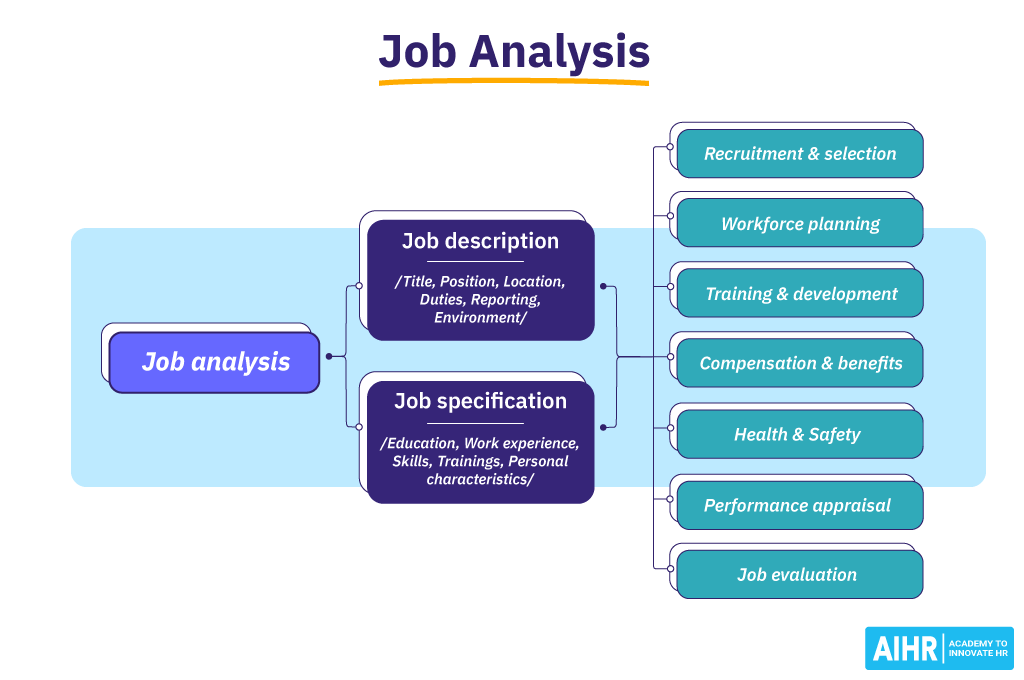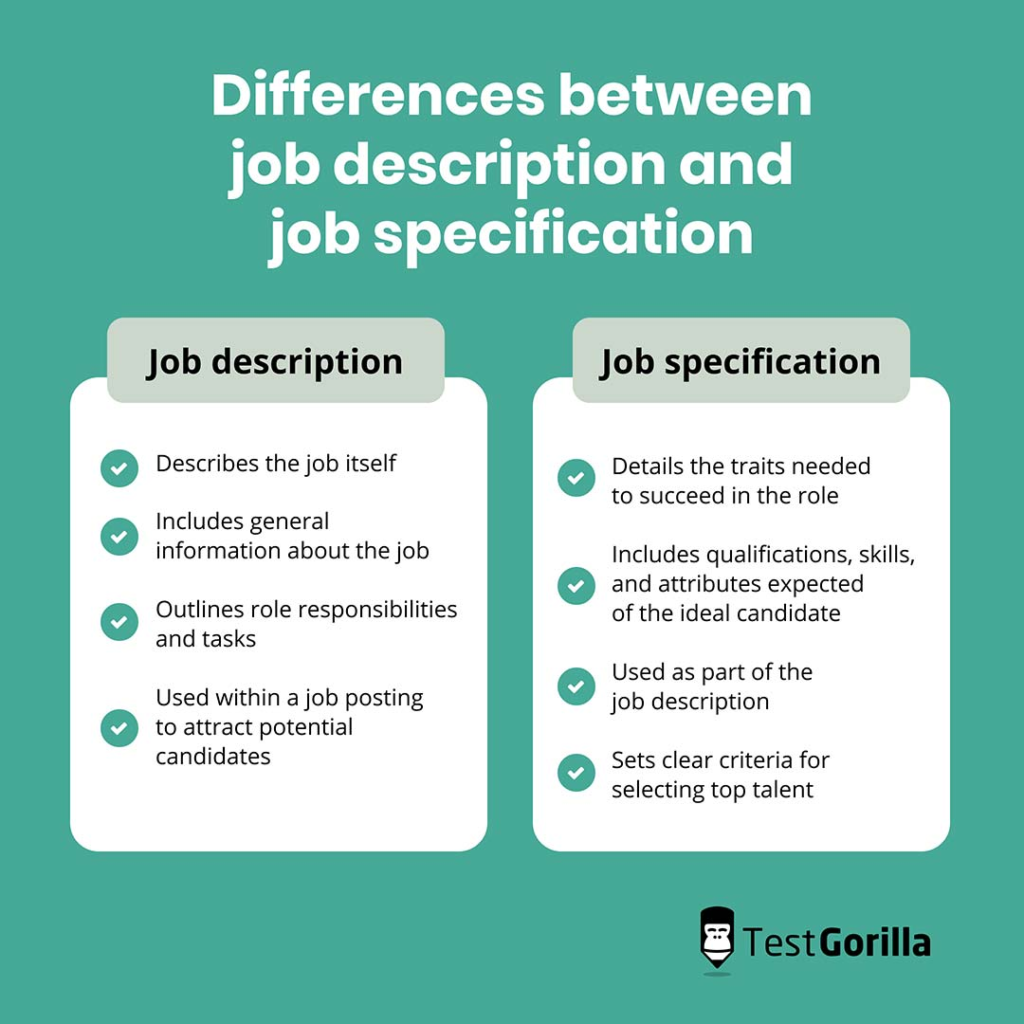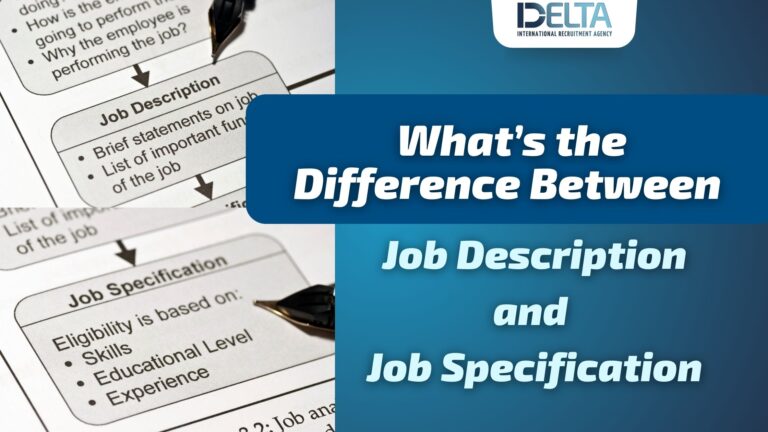When looking at a job, there are two key papers that help spell out what skills and qualifications a candidate should have to do the job right.
Here is the deal: A job description lists all the tasks and responsibilities the company wants the candidate to handle. On the other side, a job specification outlines the qualities, experience, skills, and qualifications the company hopes to find in a candidate. Let us explore this a bit more.

Image Source: aihr.com
What exactly is a job description?
A job description is a detailed document about an empty job. It mentions the job title, where it is, what you’ll do, your responsibilities, and your role. The HR manager makes this to get people to apply for the job. They often save it as a PDF because it’s easy to edit with free PDF software.
Components of Job Description
- Job Title: The name of the job that’s open.
- Job Location: Where the selected person will be working.
- Job Role: What the company expects you to do.
- Responsibilities and Duties: The tasks you’re responsible for.
- Salary: How much money the company is offering for the job. It might or might not be up for negotiation.
- Incentives: Extra money or rewards the company gives when you meet your goals.
- Allowances: Benefits and expenses the company covers for you.
Advantages of Job Description
- Simplifies HR Work: Makes hiring and selecting people easier for the HR department.
- Saves Time: Helps companies find the right candidates quickly and speeds up background checks.
- Builds Job Specification: Forms a basis for creating a detailed list of what the job requires.
- Clarifies Company: Tells candidates what the company is all about and what it offers.
- Outlines Expectations: Gives an overview of the job and spells out what the company expects.
- Familiarizes Candidates: Helps candidates quickly understand the work environment.
Downsides of Job Description
- Changes Over Time: Job descriptions don’t stay the same; they change as the company grows.
- Highlights Positives Only: It talks about the good things in a job but ignores the not-so-great parts.
What Is Job Specification?
Imagine job specification as a detailed list of what makes someone the right fit for a job. It’s like a recipe for the perfect candidate.
Once the manager has written out the job description (which is like the job’s story), they create the job specification to figure out exactly what ingredients the ideal candidate should have. This includes things like skills, knowledge, education, and experience – all the things that will help them excel in the role.
So, in a way, the job specification is like the manager’s guide to finding the perfect match for the job, making sure they have all the right qualities and abilities to tackle the tasks at hand.
Components of Job Specification
- Educational Background: This part is all about what kind of education you need, like what you learned in school, college, or any special qualifications.
- Skills: These are the specific things you should be good at to do the job well. It’s like having the right tools for the task.
- Experience: This is like your job history. It includes details about where you worked before, what your role was, how much you earned, what you did, and for how long.
Advantages of Job Specification
- Defines Criteria: By setting clear criteria, job specifications help recruiters in Pakistan know what to look for in resumes, making the hiring process more straightforward.
- Benchmark for Training: Once someone is hired, the job specification serves as a guide for the training process, ensuring that new employees learn what they need to excel in their roles.
- Helps Candidates: Job seekers can use job specifications to find roles that match their skills and qualifications, making the job search more targeted and efficient.
- Performance Analysis: After someone is hired, the job specification becomes a tool for evaluating their performance. It helps measure how well they are meeting the expectations outlined in the specification.
Disadvantages of Job Specification
- Changes with Tech: Job specifications might need updating as technology evolves. What was necessary for a job yesterday might not be the same today.
- Lengthy Process: Creating a job specification takes time because it requires a deep understanding of the job. It’s not just about listing tasks; it’s about knowing the ins and outs of what it takes to succeed in that role.

Image Source: testgorilla.com
Job Description and Job Specification Example
XYZ Ltd. has a job opening for a Tele Marketing Executive, and they’ve shared the details on a job portal. Let’s take a closer look:
Job Description – Tele Marketing Executive
About Us: XYZ Ltd. is a well-established sales and marketing powerhouse, operating across the country. With a workforce of 800 employees, they specialize in business-to-business sales, catering to major corporate firms and industry leaders.
- Job Title: Tele Marketing Executive
- Role: The company is seeking an individual to fill the role of a Tele Marketing Executive. This position involves making outbound calls to turn potential customers into clients. While primarily an office-based role, there may be occasional travel to different cities.
Duties and Responsibilities:
- Call prospective customers: Initiating contact with potential clients.
- Influence customers to buy: Convincing and persuading customers to make a purchase.
- Prepare sales reports: Documenting and summarizing sales activities.
- Handle direct customer inquiries: Addressing customer queries directly.
- Achieve sales targets: Meeting set sales goals.
- Identify prospects and grab new business opportunities: Recognizing potential clients and seizing new business chances.
- Maintain sales record on sales CRM software: Recording sales information on the company’s CRM software.
Job Specification – Tele Marketing Executive
- Educational Qualification: Any graduate/MBA in Marketing or Sales
Skills and Competencies:
- Excellent communication skills: Ability to convey messages effectively.
- Good time management skills: Efficiently organizing and prioritizing tasks.
- Result-driven: Focused on achieving goals and producing outcomes.
- Ability to work under pressure: Capable of handling work demands and stress.
- Persistent: Showing determination and perseverance.
- Positive attitude: Approaching tasks with optimism.
- Excellent negotiation skills: Capable of negotiating effectively.
- Proactive: Taking initiative and being forward-thinking.
- Experience: 0-1 year of experience in sales or marketing
It’s important to remember that job descriptions and specifications play crucial roles in the recruitment process, each serving its unique purpose. If you’re looking for a recruitment agency to recruit overseas talent from Pakistan, Delta International Recruitment Agency is the #1 recruitment agency in Pakistan for Bahrain providing manpower recruitment services.
Final Words:
When reaching out to candidates, using a business email with a domain is recommended for better open rates. As per a 2020 survey, around 60% of consumers prefer email for company updates, and the average open rate for business emails ranges between 15% to 25%.











.webp)
















